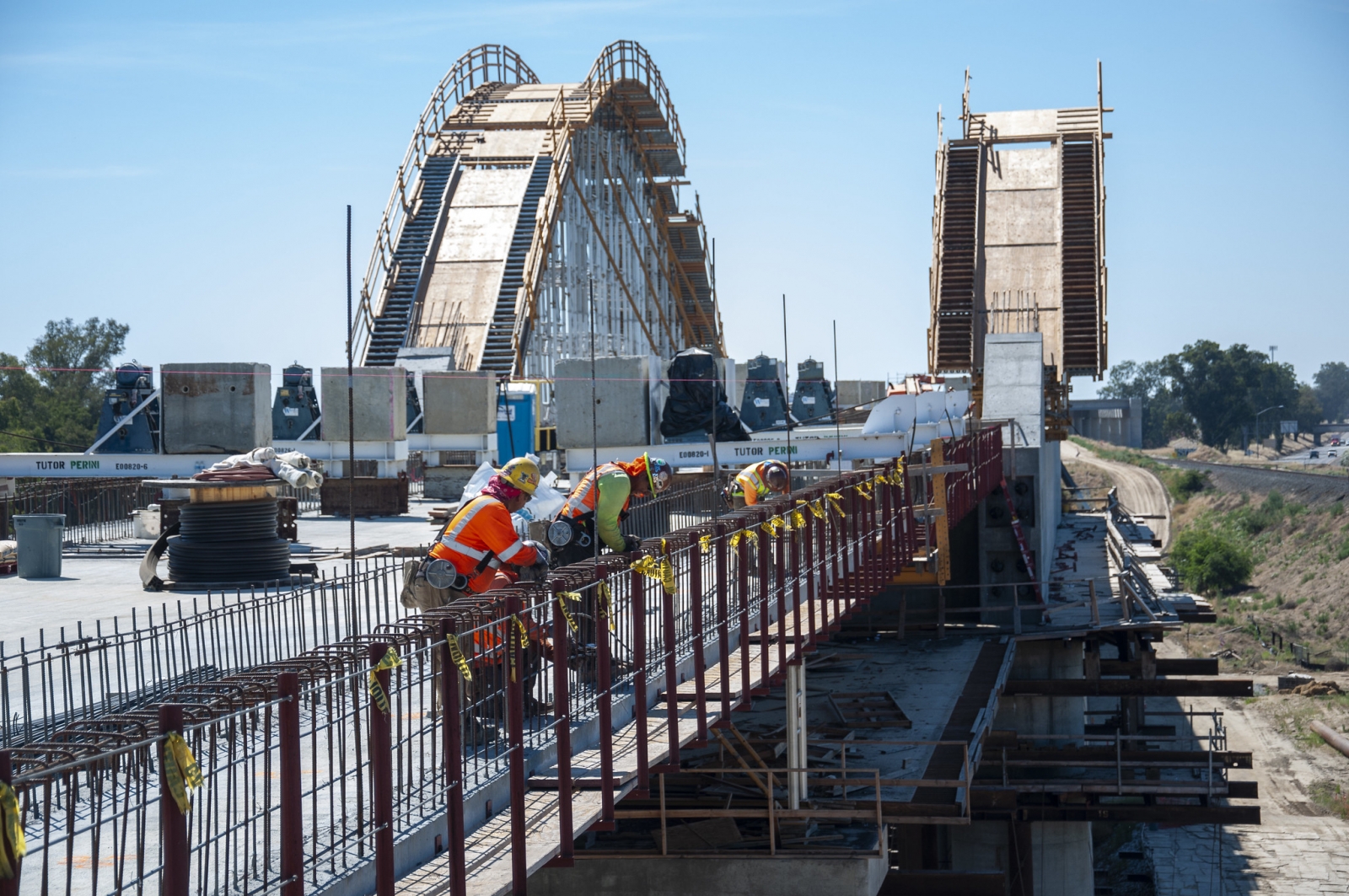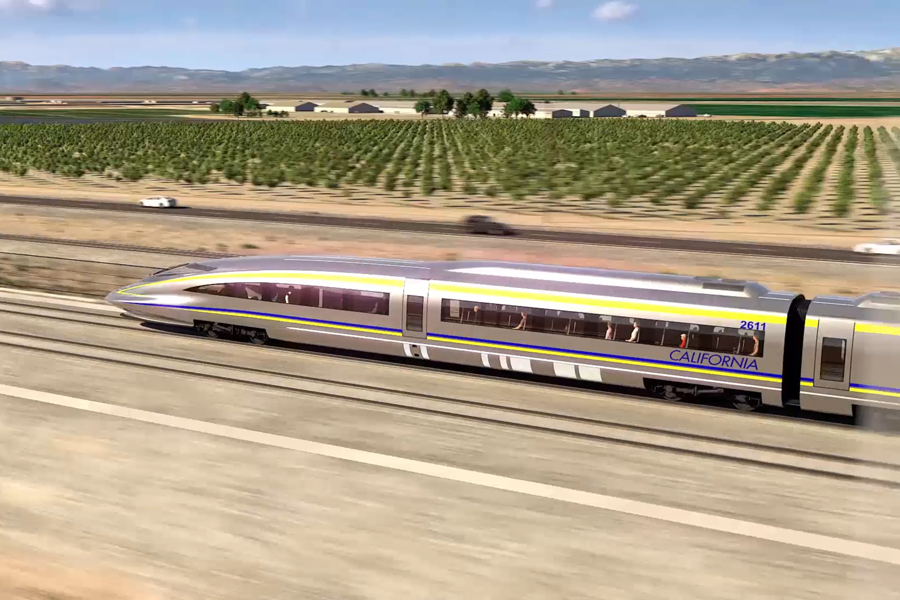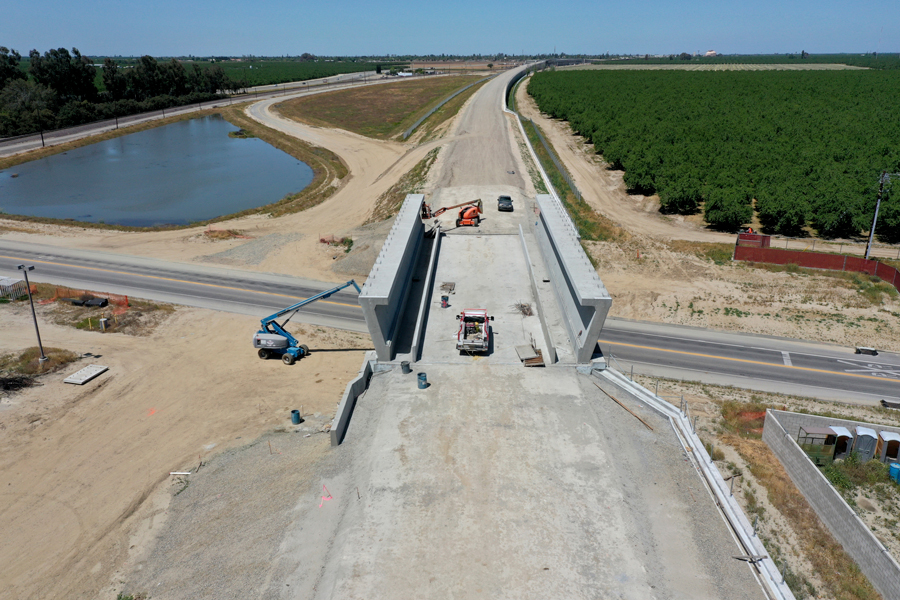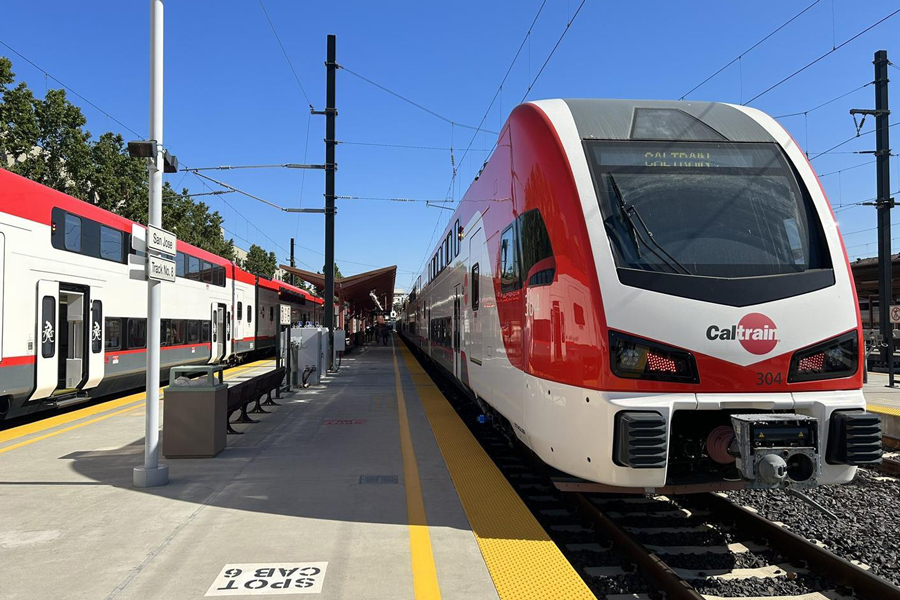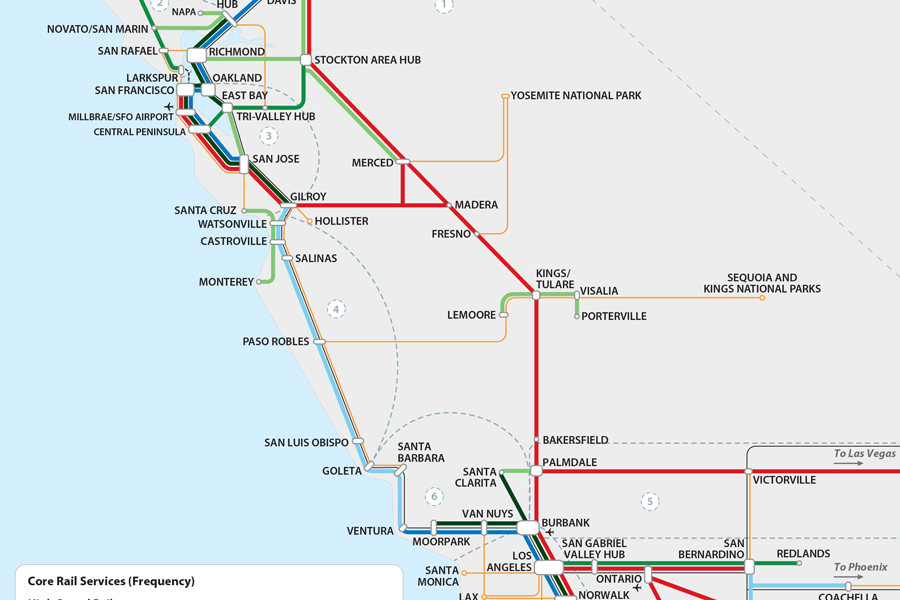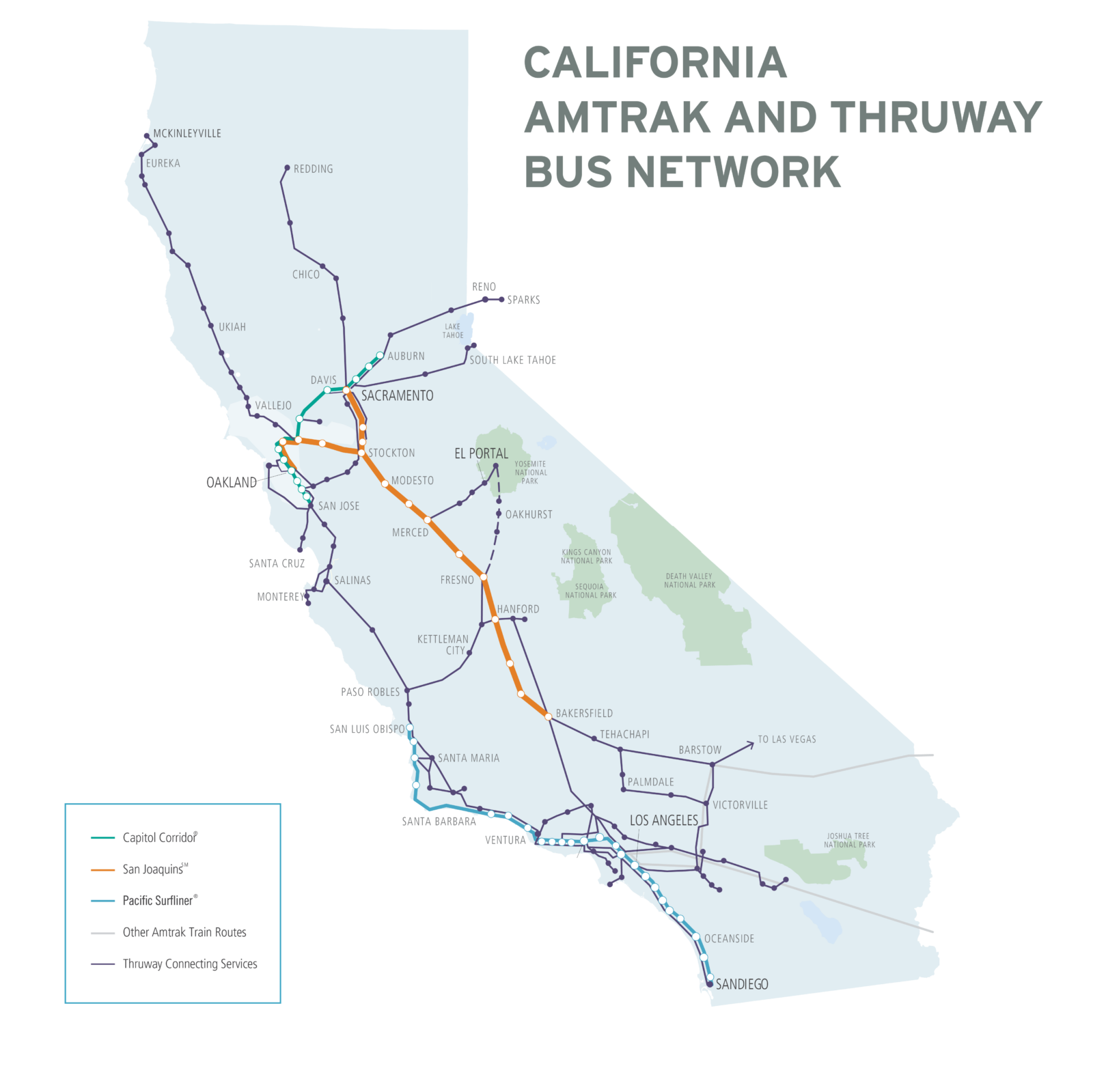
Segments of 220-mph high-speed line will be coordinated with California’s extensive network of trains and buses.
Boosting an Already Robust Network
California is taking the Integrated Network Approach to its high-speed rail system – meaning that segments of high-speed line will be added to the state’s already robust network of trains and buses over time.
Feeder buses are timed to meet trains at many stations, with passengers using a single ticket for both parts of the trip. Commuter rail and local bus networks extend the reach to most of the state.
An innovative state rail plan is being used to coordinate actions of the California High Speed Rail Authority and many transit agencies as improvements are made.
As a coordinated network, every train and bus route will see a big boost in ridership, as segments of high-speed line are finished.
High-speed rail stations will be built to make transferring between high-speed trains, conventional trains and feeder buses quick and easy.
Most of the system has environmental clearance
Just as the Interstate Highway network was built in segments over several decades, California’s high speed rail network will be built in segments.
The timing of those segments is driven in large part by mountain ranges and funding availability.
The Central Valley and Silicon Valleys segments are under construction.
The planning and environmental documents for the remaining segments are expected to be approved this year. Then, the state can seek additional funds to expedite construction of the remaining sections.
Here is a quick overview of each segment and its status.
The California High Speed Rail Authority has a more in-depth overview of the segments on its website
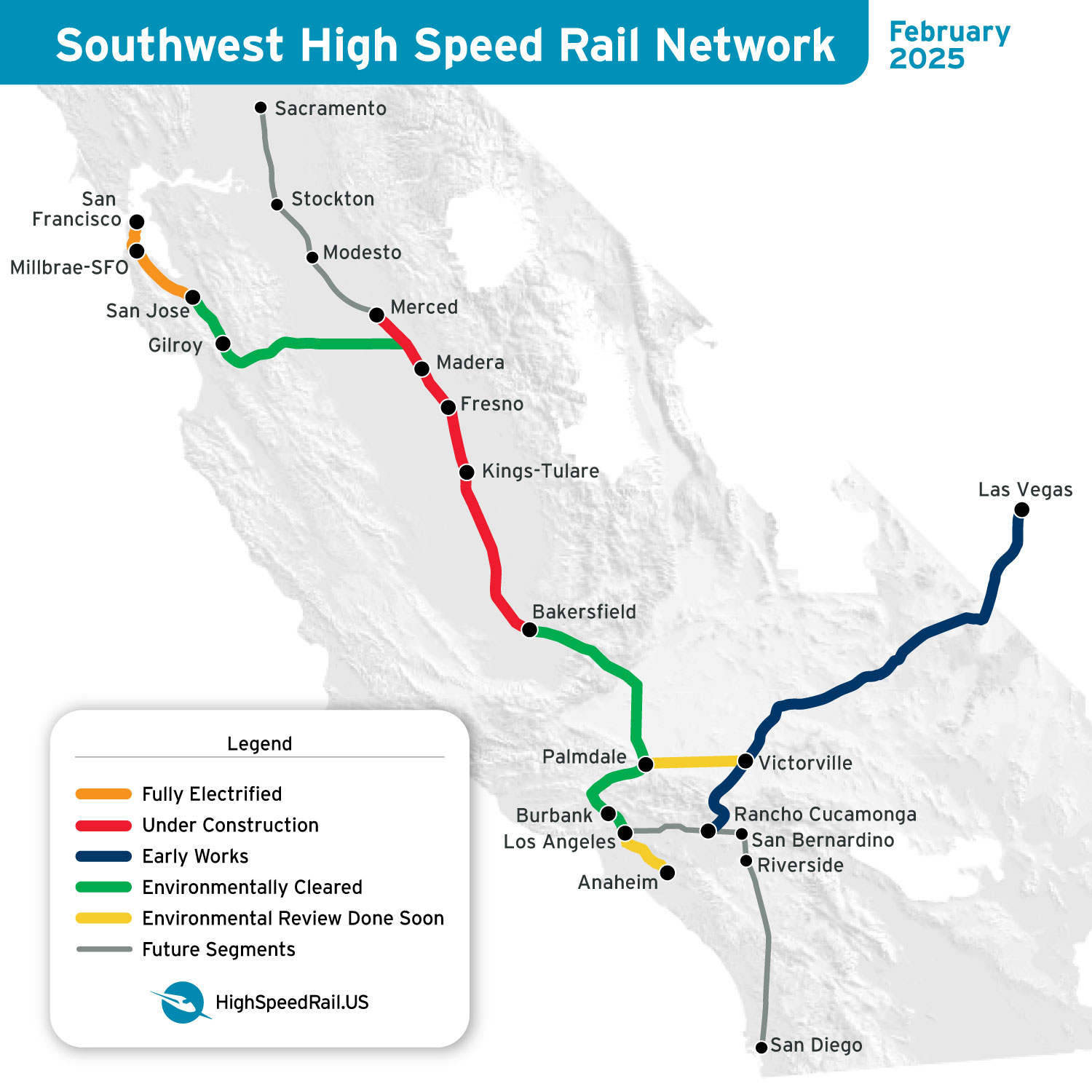
Two Segments are Under Construction
The Central Valley
Bakersfield – Fresno – Merced
Under Construction
The first, 170-mile segment of high-speed line—the backbone of the whole system—is now being built in the Central Valley. It is the best place to demonstrate the power of high-speed trains. Its opening will be coordinated with improvements to existing passenger rail and feeder bus networks.
The Silicon Valley
San Francisco – San Jose
Under Construction
Existing Caltrain service from San Jose to San Francisco will be electrified and upgraded, which will allow high-speed trains to share tracks with new, high-performance commuter trains.
One Big Segment is Ready to Go
Brightline West:
Las Vegas – Rancho Cucamonga
Ready for construction
Brightline West is poised to begin construction. The initial design was developed by a major casino owner and gained environmental clearance in 2009.
The new Las Vegas station will be built near McCarren Airport as part of a hotel and casino complex. The Rancho Cucamonga station will allow an easy transfer to Metrolink.
The Mountain Passes Have Environmental Clearance
Pacheco Pass – closing the northern gap
San Jose – Merced
Environmental Approval Complete
Connecting the Central Valley directly to Silicon Valley and San Francisco will require tunneling through the mountain range that separates them. The Pacheo Pass does not currently have railroad tracks.
In the interim, a connecting Amtrak bus began operating in 2020.
Tehachapi Pass – closing the southern gap
Bakersfield – Palmdale
Environmental approval complete
The Tehachapi Mountains pose a major barrier to creating a north-south passenger rail connection, a glaring missing piece of the California network. Freight trains cross the mountains on the famed Tehachapi Loop, a slow but busy single-track railroad that lacks the capacity for passenger trains. So, an extensive network of buses connects Bakersfield to cities throughout the Los Angeles area and the High Desert. These buses can be enhanced until the mountain crossing can be constructed.
Los Angeles Metro Area
Antelope Valley
Palmdale – Burbank
Environmental clearance underway
The California High Speed Rail Authority has chosen the preferred routing for this challenging section, much of which will be in tunnels.
Metrolink’s Antelope Valley line could be upgraded as an interim solution.
High Desert Corridor
Victorville – Palmdale
Environmental clearance underway
The High Desert JPA is designing a connection between Brightline at Victorville to Palmdale where it could connect with the Metrolink Antelope Valley line and the Los Angeles – San Francisco high-speed line when it is built.
Burbank – Los Angeles
Burbank Airport – Los Angeles Union station
Environmental Clearance Approved
This segment begins at a new underground station adjacent to a new airport terminal that will replace the existing terminal. Two new, electrified tracks will be built alongside the existing freight tracks.
Los Angeles – Anaheim
Los Angeles – Anaheim
Environmental approval underway
This segment will share right of way with busy freight tracks used to access the ports of Los Angeles and Long Beach. The existing three-track mainline will be re-built with two tracks with overhead wires and two tracks without. Freights will primarily use the two non-electrified tracks, but will also share the electrified tracks.
Future Segments
Inland Empire
Los Angeles – Rancho Cucamonga – Bakersfield
Future Segment
This segment is officially part of “phase 2” and planning will begin after the Los Angeles – San Francisco spine is complete. However, building new electrified tracks on this segment will become more urgent as Brightline West begins construction.
Sacramento – Stockton
Future Segment
A new high-speed line will be designed as construction wraps up on the Los Angeles – San Francisco spine.
In the interim, negotiations are underway to electrify a secondary Union Pacific line between Sacramento and Stockton to allow for high-frequency ACE commuter trains and high-speed trains, similar to Caltrain.
Inland Empire – San Diego
Bakersfield – San Diego
Future Segment
This segment is part of “phase 2” and planning will begin after the Los Angeles – San Francisco spine is complete.
Stockton – Merced
Future Segment
A new high-speed line will be designed as construction wraps up on the Los Angeles – San Francisco spine.
In the interim, the Union Pacific is being upgraded to extend ACE commuter rail from Stockton to Merced. The Stockton – Ceres segment is under construction now.
Related Content
California State Page
California is at the forefront of high-speed and regional rail
California is Building High-Speed Rail
A new high-speed line linking Los Angeles to San Francisco will be a game-changer for the most aggressive state rail program in the country.
Caltrain: Transforming Regional Rail
Caltrain, the Silicon Valley’s railroad, is being modernized to be the first true regional rail line in the U.S.
California Integrated Plan
The visionary California rail plan will produce a stunning increase in ridership and revenue.

Get Involved
Tell the United States Congress: It’s time to reconnect the country with high-speed and regional rail!
